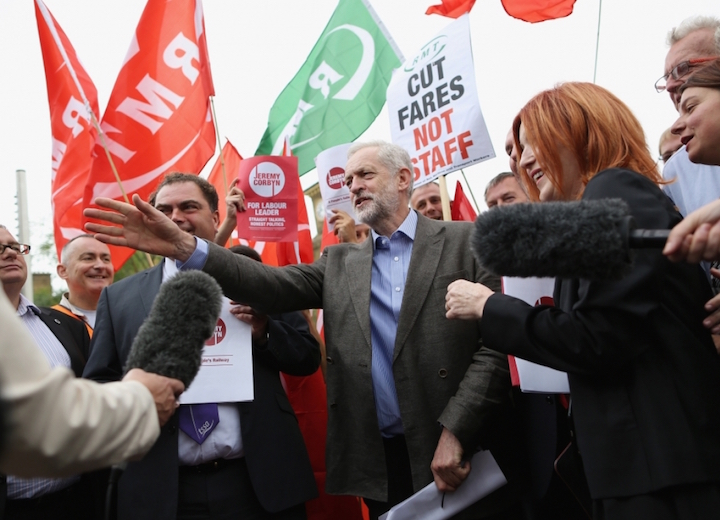Search
Blogs
A New Politics in America - Part 2 - Economic Crisis of the 1970s
| Dan La Botz March 15, 2016 |

This is the second part of an article about the new politics in America today. The first part can be found here.
Deindustrialization and Downsizing Gut the Labor Movement
The second development that led to a new far right was the economic crisis of the 1970s, or, to be specific, the two recessions of the 1974-75 and 1979-82. These two downturns caused employers to close steel mills, auto plants and other manufacturing plants throughout the Northeast and the Midwest with a devastating impact on the working class and on the labor movement.
A New Politics in America - Part 1 - Roots in the 1960s
| Dan La Botz March 14, 2016 |

This is the first part of an article about the new politics in America today.
The presidential election campaign of 2016 represents a turning point in American politics, raising issues and political agendas that would have been unthinkable in the United States only a few years ago. The major media and the public debate whether or not Republican Donald Trump is a fascist, while at the same time there is a discussion about whether Democrat Bernie Sanders’ version of democratic socialism is the answer to the country’s problems. Trump’s political rallies have, at his instigation, become violent and he now threatens to send his followers to disrupt Sanders’ rallies.
“Embrace of the Serpent”: The Continuing Conquest
| Dan La Botz March 10, 2016 |
 Will we ever get over this thing called civilization? That's what I wondered as I watched The Embrace of the Serpent, directed by Colombian filmmaker Ciro Guerra, a black-and-white film in several indigenous and European languages that has some of the qualities of a documentary. But this is a truer-than-history fiction, fabricated out of the travel diaries of two botanists, Theodor Koch-Grunberg (Jan Bijvoet) and Richard Evan Schultes (Brionne Davis), both of whom traveled in the Amazon region, the former in 1909 and the latter in 1940. The challenging and sometimes horrifying experiences of the two scientists are linked together by the character Karamakate who serves as guide to both and a challenge to each. (Nilbio Torres plays the young Karamakate and Antonio Bolívar the old Karamakate.) Both botanists are looking for yakruna, a rare, sacred, and hallucinogenic plant, and their search takes them into the jungles inhabited by peoples menaced by the encroaching modern world.
Will we ever get over this thing called civilization? That's what I wondered as I watched The Embrace of the Serpent, directed by Colombian filmmaker Ciro Guerra, a black-and-white film in several indigenous and European languages that has some of the qualities of a documentary. But this is a truer-than-history fiction, fabricated out of the travel diaries of two botanists, Theodor Koch-Grunberg (Jan Bijvoet) and Richard Evan Schultes (Brionne Davis), both of whom traveled in the Amazon region, the former in 1909 and the latter in 1940. The challenging and sometimes horrifying experiences of the two scientists are linked together by the character Karamakate who serves as guide to both and a challenge to each. (Nilbio Torres plays the young Karamakate and Antonio Bolívar the old Karamakate.) Both botanists are looking for yakruna, a rare, sacred, and hallucinogenic plant, and their search takes them into the jungles inhabited by peoples menaced by the encroaching modern world.
Drugs, War, and Capitalism
| Dan La Botz February 29, 2016 |

Dawn Paley. Drug War Capitalism. Oakland: AK Press, 2014. Notes. Index.
Dawn Paley’s Drug War Capitalism presents an overview of the drug wars in several Latin American countries: Columbia, Mexico, Guatemala, and Honduras. Mexico receives the most attention, and Paley provides a wealth of information from a variety of sources documenting the impact of the war-on-drugs on Mexican society and on the role of the United States. She focuses especially on the relationship between the drug business, government policies, and the militarization of Latin American societies, elucidating the role of U.S. policies such as Plan Mérida. She demonstrates the nefarious part played by the U.S. government’s overall structuring of both the drug market and the drug war by elaborating on both the military and civilian aspects of U.S policy in an attempt to prove her thesis, which is the war on drugs forms part of a plan—or if not a plan at least a process—that furthers capitalism, especially its expansion “…into new or previously inaccessible territories and social spaces.” (p. 15) Paley’s book contributes to, but does not resolve the debate over the relationship between drug dealers, capitalism, and the state.
Fernando Cardenal, Nicaraguan Christian Revolutionary– Presente!
| Dan La Botz February 24, 2016 |

Fernando Cardenal, the revolutionary Jesuit priest who served as Secretary of Education in the Sandinista government of Nicaragua, died in Managua on February 20 following complications arising from heart surgery. He was 82 years old.
Cardenal, joined the Sandinista Front for National Liberation (FSLN) before the Nicaraguan revolution of 1979, having been like his brother the poet Ernesto Cardenal, also a priest, recruited by top Sandinista leaders. Cardenal played a key role in the 1970s, before the revolution, in building the Christian Revolutionary Movement and after the revolution he was the leader and organizer of the National Literacy Campaign. When in 1984 Pope John Paul II insisted that the Cardenal leave the Sandinista government, he refused, writing that he could not believe that God would want him to stop serving the poor.
In the early 1990s Cardenal broke with Daniel Ortega’s increasingly authoritarian Sandinista government, returned to the Jesuit order in 1997, and continued his work among the poor.
The San Andrés Accords--Twenty Years Later
| Dan La Botz February 19, 2016 |

Twenty years ago the Mexican government signed the San Andrés Accords Regarding the Rights and Culture of the Indigenous that granted autonomy to Indian communities. Yet today, some argue that the indigenous people of Mexico, who represent about 10 to 15 percent of the population of the country, are worse off than they were then. What happened and where are things now?
Pope Francis in Mexico: The Last Come First
| Dan La Botz February 18, 2016 |

The Pope in Mexico Criticizes the Government, Big Business, and the Church Hierarchy, While Siding with Working People, the Poor, Migrants, and the Indigenous
Pope Francis, during his six-day visit to Mexico in mid-February, criticized the country’s political and economic elite as well as the Catholic Church hierarchy for their preoccupation with wealth and power, while simultaneously expressing support for the country’s working people and the poor. The Pope’s presence in Mexico constituted an indictment of Mexico’s ruling elite and of the society of inequality, violence, and corruption that they have created.
The Pope also criticized Donald Trump and other Republicans who call for building a wall between Mexico and the United States calling their views "not Christian." Said the Pope: “A person who thinks only about building walls, wherever they may be, and not of building bridges, is not Christian. This is not the gospel.”
Sanders Supporters March from Union Square to Zuccotti Park
| Dan La Botz February 1, 2016 |

Some 3,000 supporters of Bernie Sanders marched through the streets of Manhattan yesterday from Union Square, historic site of labor and left rallies since the beginning of the last century, to Zuccotti Park, the site of the Occupy Wall Street movement of 2011.
Will "Friedrichs" Derail Teachers Unions?
| Lois Weiner January 31, 2016 |
 Much has been written about the harm the Supreme Court will wreak on US labor if it overturns the right of public sector unions to charge nonmembers a fee equal to the cost of the union’s expenses in representing them. Pundits on the left and the right have predicted a cataclysm.
Much has been written about the harm the Supreme Court will wreak on US labor if it overturns the right of public sector unions to charge nonmembers a fee equal to the cost of the union’s expenses in representing them. Pundits on the left and the right have predicted a cataclysm.
Mexico Labor Year in Review - 2015
| Dan La Botz January 22, 2016 |

2015 was another in a series of very bad years for Mexico. Mexican working people continued to experience in 2015 the difficulties of a stagnant economy, the violence of the drug war, repression of the labor and social movements, and the rule of corrupt political parties. Few workers had legitimate labor unions with which to resist employer and government policies, and fewer had the desire to engage in strikes. Yet some workers—teachers in southern Mexico, farm workers in Baja California, and maquiladora workers in Juarez—did courageously attempt to fight for their rights and for greater power. We begin this report with the drug wars that have so dominated Mexican life for the last decade.
Contemporary American Radicalism: The View from Below
| Dan La Botz January 12, 2016 |

Howard Brick and Christopher Phelps. Radicals in America: The U.S. Left Since the Second World War. New York: Cambridge University Press, 2015. 355 pp. Photos. Bibliography. Index.
Howard Brick’s and Christopher Phelps’ Radicals in America, covering the period from 1939 to 2014, is a masterful narrative history of the left of our time, an account that integrates the experience of the post-war left into American political, economic, and social history, with an eye to the cultural context as well.
Standing against war, repression and tyranny
| Riad Azar December 9, 2015 |

In this statement, socialist organizations from the Middle East to Europe to North America speak out against war, racism and repression.
WE FIGHT dictatorships, imperialist aggression and Daesh [the Islamic State in Iraq and Syria, or ISIS]. We reject the politics of "national security," racism and austerity. It's time to mobilize!
What Happened to the Mexican Revolution?
| Dan La Botz November 20, 2015 |

November 20 marks the anniversary of the Mexican Revolution of 1910‐1920. The party created by that event, the Institutional Revolutionary Party (PRI), is in power today. Yet, over the last nine years 60,000 people have been killed and 25,000 forcibly disappeared in the drug wars, while more than half the population lives in poverty. Foreign investment pours into Mexico to take advantage of wages lower than China’s, while the country is controlled by a handful of billionaires. One has to wonder: What happened to the Mexican Revolution?
Can Workers of the Global South Change the World Labor Movement?
| Dan La Botz November 19, 2015 |

Immanuel Ness. Southern Insurgency: The Coming of the Global Working Class. London: Pluto Press, 2016. 226 pages. Tables. Notes. Index. Paper $28.
Immanuel Ness, professor of Political Science at City University of New York and a prolific writer on labor, has written an important new book whose title, Southern Insurgency: The Coming of the Global Working Class, should, I think, have ended in a question mark. Manny, a friend and a colleague—who, when I have seen him lately, has been in a state of jetlag from his travels to centers of worker activism around the globe—argues that those interested in labor should direct their attention from the stagnant and declining labor movement of the Global North to the migrant and contract laborers in places like South Africa, India, and China who are building democratic, militant, rank-and-file movements from below—struggles that, Ness suggests, are laying the foundations of a new global labor movement.
Jeremy Corbyn versus the Third Way
| Jason Schulman September 11, 2015 |
A development which no one expected now appears inevitable. Barring either otherwordly intervention or old-fashioned political dirty tricks, Jeremy Corbyn, long on the left wing of the British Labour Party, is slated to become that party's new leader.

And the rabidly pro-capitalist heirs of long-gone "New Labour" leader Tony Blair, as well as the traditional right wing of the Labour Party, are absolutely apoplectic.
